The Top Leadership Coaching Books

Executive coaching can be a rewarding and fulfilling career, but it requires deep introspection and commitment and an array of interpersonal and leadership skills. Becoming an executive coach and growing in the role demands lifelong learning — and that means delving into the kaleidoscopic variety of leadership, business personal development, and executive coaching books.
Leadership coaching books range from topics that include self-introspection to become more effective, how to attract new clients and keep the calendar full, and how to make it easier for people to do their jobs. The goal of coaching books for leaders is to deepen your skills and become an effective coach that everyone wants to hire.
As Vistage Chair Rodger Jenkins explains, “Leaders are readers. There are lots of great books out there to help you stay sharp.”
Aren’t there ever! In fact, a comprehensive list of executive coaching resources threatens to overwhelm. That’s why we’ve consulted with coaches of various tenures to garner their top picks.
Whether you’re seeking to enhance your one-to-one coaching skills, become a better group facilitator, put your own practice in order, or pass along some insightful reads to clients, we have the recommendations you need.
The following is a list of the best books on leadership coaching that have been published to date.
- Trillion Dollar Coach by Bill Campell
- The Disciplined Listening Method by Michael Reddington
- Fierce Conversations by Susan Scott
- The Introvert’s Edge by Matthew Pollard
- The Advice Trap and The Coaching Habit by Michael Bungay Stanier
- The Secrets of Facilitation by Michael Wilkinson
- Peernovation by Leo Bottary
- The Go-Giver by Bob Burg and John David Mann
- Traction by Gino Wickman
- Think Again by Adam Grant
- The Artist’s Way by Julia Cameron
- Positive Intelligence by Shirzad Chamine
- Building a StoryBrand by Donald Miller
- The Gifts of Imperfection by Brene Brown
- How to Win Friends and Influence People by Dale Carnegie
- The Road to Character by David Brooks
1. Trillion Dollar Coach by Bill Campell
Ever wondered what coaching Steve Jobs of Apple, Larry Page and Eric Schmidt of Google, and other top executives relied on? This book — written by a Silicon Valley executive coach whose clients have achieved combined revenues of over $1 trillion — provides an inside peek. Most importantly according to Vistage Chair Marty Stowe, it imparts simple, universal principles applicable to any coaching practice.
Bill Campbell mentored leaders in Silicon Valley, financial experts in New York City, and countless entrepreneurs who needed guidance on how to run and grow their businesses. The authors interviewed more than 80 people to get a feel for who Bill Campbell was as an individual and explore how his coaching style helped so many people find success. Bill Campbell has since passed on, but his legacy is a strong one, and this book is an homage to a man who brought humanity to the corporate world.
Trillion Dollar Coach by Bill Campbell
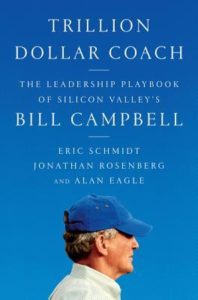
2. The Disciplined Listening Method by Michael Reddington
Author Michael Reddington is a certified forensic interviewer who shares his listening techniques with his readers. He shows how leaders tend to introduce their personal biases into a conversation, allow unrealistic expectations to influence their desire for results, and how these and other thought processes lead to missed opportunities. Once a leader can recognize these patterns, they can unlearn them and engage in healthier thought patterns to listen to others in a thoughtful way. This leads to better interactions and the ability to influence people to work together in a positive manner.
“I recently heard the author speak to my Vistage group, and he shared his approach to listening,” says Becky Tolnay, a Vistage Chair who calls Tallahassee, Florida, home. “He helps us to understand where we are, possibly unintentionally, making mistakes when we think we are listening. Then he lays out how to approach a conversation.”
The Disciplined Listening Method by Michael Reddington
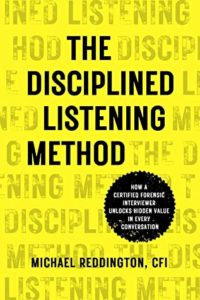
3. Fierce Conversations by Susan Scott
Susan Scott lays bare the fact that people often avoid uncomfortable conversations for a variety of reasons, even at the leadership level. That’s what makes this one of the great leadership coaching books, as it shows the importance of finding one’s inner steel and having that tough conversation. The reader learns how to clear the air, become a more effective communicator, and have those hard discussions without making others feel bad about what they hear.
A Vistage Chair favorite recommended by Tom Grogan and Niels Lameijer, among others, this book “has great tools and tips to master the art of conversation,” says Kevin Trout, who sold his medical distributorship and became an executive coach. He points out that “it helps to be aware of these factors when coaching one-on-one.” Agreed.
Fierce Conversations: Achieving Success at Work & Life One Conversation at a Time by Susan Scott
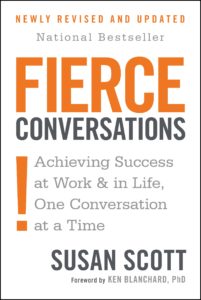
4. The Introvert’s Edge by Matthew Pollard
When it comes to making sales, introverts have an advantage that comes from their observational skills. The book helps the introvert benefit from this skill set through compassionate listening, parsing the nuance of what the customer is looking for, and being able to deliver a low-impact sales pitch that’s highly effective. Readers also learn how to be comfortable interacting with others and finding their confidence.
Jeannette Hobson, who has been a coach for more than two decades, says, “Being an introvert myself, I find this wisdom very helpful when coaching another introvert.”
The Introvert’s Edge: How the Quiet and Shy Can Outsell Anyone by Matthew Pollard
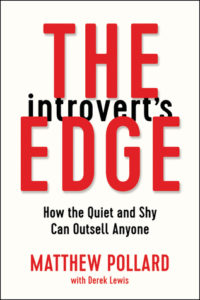
5. The Advice Trap and The Coaching Habit by Michael Bungay Stanier
The core purpose of coaching is to advise clients on how to get the best out of themselves and perform as an admired leader. At issue is the fact that coaches often stop listening fully to their clients and provide advice that’s hard for the client to follow. The Advice Trap shows coaches how to roll back their advice-giving habits, listen more closely to the client’s issues and needs, and help them more fully understand how to use the advice that’s being delivered.
Vistage Chair Francine Lasky, known as a straight-shooter by her clients, “loves the ‘shut up and listen’ advice” in these books.
The Advice Trap and The Coaching Habit by Michael Bungay Stanier
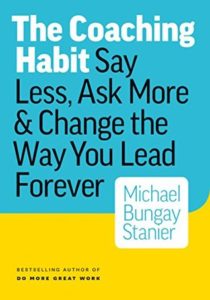
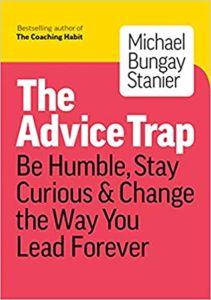
6. The Secrets of Facilitation by Michael Wilkinson
Leaders often face the need to get groups to function and perform to plans, yet it’s not always easy. The Secrets of Facilitation helps the reader devise strategies and use techniques to get groups to take ownership of their work. This is one of the must-buy leadership books because the techniques are proven to work with groups, no matter what the challenge may be.
A glowing review from Tolnay: “A great resource for any facilitator. The methods and processes go beyond building a peer group and apply to working with teams and groups to help participants achieve results.”
The Secrets of Facilitation by Michael Wilkinson
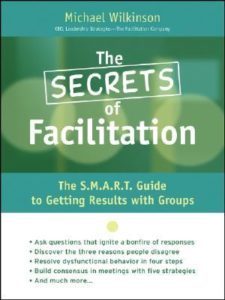
7. Peernovation by Leo Bottary
Looking for an easy yet impactful read? Jenkins suggests this investigation of what happens when a group of people who share common values, yet different perspectives and skills, bring ideas to life. It highlights the benefits of peer advisory groups and what can happen when a like-minded group of people comes together to work towards a shared goal.
Peernovation: What Advisory Groups Can Teach Us About Building High-Performing Teams by Leo Bottary
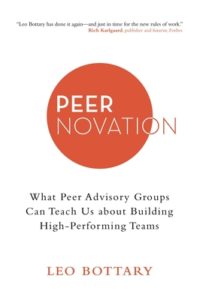
8. The Go-Giver by Bob Burg and John David Mann
The Go-Giver highlights the benefits and importance of giving instead of getting as a leader. It teaches the reader to take a deep look inside at themselves and ask questions about their motivations, how to make changes, and be able to give freely to others. The end results of being generous to others can result in building a successful business, improving morale, and opening up to new opportunities.
Stowe describes this book as “a business parable about the power of putting others first.” He applied the principle of helping others, expecting nothing in return, as he built his practice. “And just as the book predicts, out of nowhere, these people start paying it back, with referrals, connections, and more.”
The Go-Giver: A Little Story About a Powerful Business Idea by Bob Burg and John David Mann
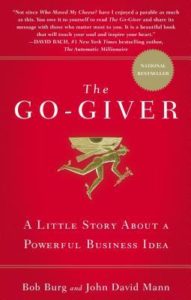
9. Traction by Gino Wickman
Traction addresses the issues that business leaders and entrepreneurs face as they try to build their businesses or simply maintain stable operations. Business leaders have to juggle the operational side of a business that helps it operate but also have to work on maintaining their vision. When these issues clash, focus is lost. The book helps business leaders regain their vision and learn how to put everything into balance in order to move forward.
Recommended again and again by Vistage Chairs, Traction “illustrates the power of team facilitation,” says Tom Grogan.
Traction: A Startup Guide to Getting Customers by Gino Wickman

10. Think Again by Adam Grant
It’s human nature to develop certain thought patterns and use them as the only lens through which to view life. However, these thought patterns can lead to bad decisions that don’t benefit oneself or an organization. Think Again by Adam Grant challenges the reader to back away from that thinking, get uncomfortable with oneself, and allow others to challenge their thinking without feeling threatened. The reader learns how it’s OK to be wrong about something and uses the experience for better decision-making processes going forward.
Coaching isn’t always a go-along-to-get-along proposition. Lasky values this book for “causing me to think about challenging group norms.”
Think Again: The Power of Knowing What You Don’t Know by Adam Grant
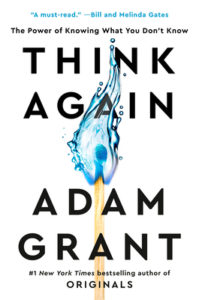
11. The Artist’s Way by Julia Cameron
Being an artist is part of being a leader. The ability to think in abstract concepts and see what lies underneath the situation helps the leader stay flexible and keep their decision-making skills sharp. Readers learn how to engage their artistic side and give themselves permission to do things that help them succeed in whatever they put their minds to.
Don’t be deterred by the title — this book reaches audiences far beyond traditional artists. Niels Lameijer, who trains Vistage Chairs and also serves as a coach himself, says that this classic “helped me connect with what drives me, what shapes me, and what I wanted to create for myself.” Best of all, it’s a workbook, so you’ll immediately apply each lesson.
The Artist’s Way: A Spiritual Path to Higher Creativity by Julia Cameron
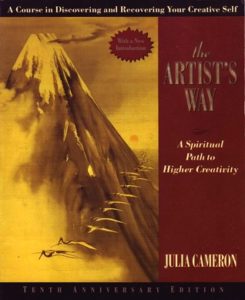
12. Positive Intelligence by Shirzad Chamine
The brain has a way of sending out negative thoughts that result in self-sabotage, especially during times of stress. Chamine provides you with mental exercises that help you move away from the negative side of your mind and move towards a positive mindset. This opens you up to better thought processes, helps you relax, and makes you a more effective leader because you’re not listening to the negative thoughts.
Tolnay says the science-backed program outlined in Positive Intelligence “helped me to identify the saboteurs in my mind and thoughts and understand how they negatively impact me and my relationships with others.” Do the exercises that are included to reap the maximum reward.
Positive Intelligence: Why Only 20% of Teams and Individuals Achieve Their True Potential by Shirzad Chamine
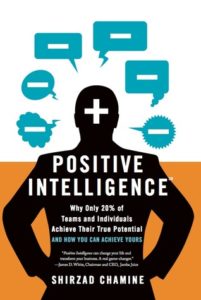
13. Building a StoryBrand by Donald Miller
Customers need a reason to buy your product, and a simple tagline or brief description doesn’t always work. Donald Miller shows you how to build a story around your brand for more effective marketing and getting your customers to listen. You’ll learn how to sell your product in a way that’s intelligent, doesn’t insult your customer, and helps you engage in active listening to learn where things are going wrong and are going right.
According to Stowe, Building a StoryBrand should be required reading for anyone seeking to become an executive coach. “The book teaches you how to make your coaching client the ‘hero’ and you the trusted guide to help them get to the place they want to be — opposite to how most coaches think.”
Building a StoryBrand: Clarify Your Message So Customers Will Listen by Donald Miller
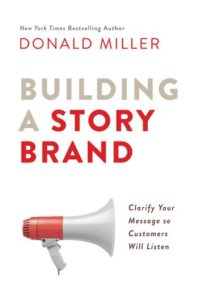
14. The Gifts of Imperfection by Brene Brown
Society expects people at the top of their game to be perfect and infallible, but it’s difficult for people to be perfect all the time. Everyone, including leaders, is human, and no one is without flaws. This book helps leaders develop their CEO leadership styles through the understanding that being imperfect is OK, and that acknowledging such doesn’t undermine one’s authority.
Brown’s work is yet another that will cause current and aspiring executive coaches to abandon the “know-it-all” approach. Tom Grogan appreciates the message that our imperfections “can really be positive influences in our growth.” A valuable perspective indeed.
The Gifts of Imperfection by Brene Brown

15. How to Win Friends and Influence People by Dale Carnegie
This classic is a “must-read for anyone serious about business,” says Jenkins. The book was originally published in 1936, but the messages in the book have resonated over the decades. It’s one of the best books on leadership coaching because it takes a soft approach to leading people and businesses.
What Carnegie discovered over his career was the fact that people respond better to others when treated with kindness, understanding, and a little bit of firmness. His advice comes in the form of actions that include six ways to make people like you, nine ways to change people without arousing resentment, and more. The core message is one of treating people well, and they will respond in positive ways.
How to Win Friends and Influence People by Dale Carnegie
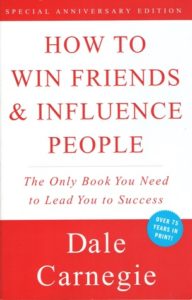
16. The Road to Character by David Brooks
David Brooks walks you through the process of self-exploration to learn more about yourself and your character. You learn how to write about yourself in the third person, look at yourself through an objective lens, and lay out your personal traits as someone else may perceive them. Along the way, you find out things about yourself that you haven’t acknowledged, enabling you to improve and strengthen areas, such as the traits of an effective leader.
The author recommends building your eulogy, rather than your resume, a message that inspires Lasky in her coaching practice and life.
The Road to Character by David Brooks
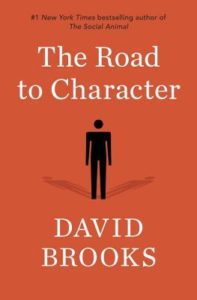
Top Executive Coaching Books for Clients
Sometimes, a well-timed book recommendation is the best gift a coach can give.
Here are some picks from Vistage Chair Michael Edwards, as well as additional selections from Hobson, Jenkins, Lasky, Tolnay, Stowe, Grogan, Lameijer, and Trout. Load up that bookstore cart!
1. The Five Dysfunctions of the Team by Patrick Lencioni
2. Good to Great, or BE 2.0 by Jim Collins
3. Start with Why or The Infinite Game by Simon Sinek
4. What Got You Here Won’t Get You There by Marshall Goldsmith
5. Culture Trumps Everything by Gustavo R. Grodnitzky Ph.D.
6. Radical Candor by Kim Scott
7. Managing Oneself by Peter Drucker
8. Atlas of the Heart Brene Brown
9. The 4 Disciplines of Execution by Chris McChesney, Jim Huling, and Sean Covey.
10. Crucial Conversations by Ron McMillan, Al Switzler, Kerry Patterson, Joseph Grenny
11. When I Say No, I Feel Guilty by Dr. Manuel Smith
12. Marketing Warfare by Jack Trout & Al Reis
Wrapping Up: The Importance of Coaching Books for Leaders
Leaders reach their positions because they have certain qualities and thought processes that improve the lives of everyone around them. Yet, they can benefit from reading coaching books for leaders to help them avoid falling into complacency and negative thinking habits. The best books on leadership coaching help improve the reader’s leadership qualities, create a great working environment, and be the person everyone else wants to be.
Category : Personal Development
Tags: executive coaching, leadership coaching, reading, Vistage Chair
